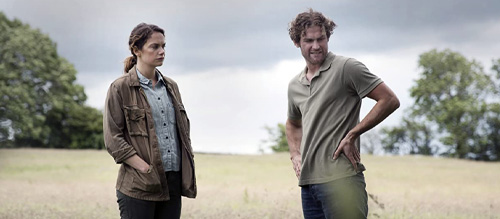Clio Barnard Films Ranked
Coming from an artistic family in West Yorkshire and achieving critical acclaim for both her short films and her feature debut The Arbor, Clio Barnard has swiftly become one of the most prominent British independent directors and certainly the most successful to come from God’s Own Country.
Clio Barnard has resolutely kept her stories local and independent from creative interference that larger projects might demand, her unmistakably voiced three features to 2020 earning her a place on our 10 Directors with 3 or More Great Films of the 2010s list.
Bradford and its surrounding areas is Barnard’s artistic stomping ground, with three of her four features being conceived, workshopped and filmed in the diverse northern English city. She spends time developing each project alongside the communities at the heart of her stories in order to ensure authenticity, and consequently all her characters and their filmed experiences feel genuine.
Barnard hasn’t really put a foot wrong in her career so far, so long live the filmmaking Queen of the North. Based on critical reception and cultural impact, from good to great, this is The Film Magazine’s Movie List of Clio Barnard Films Ranked.
Follow @thefilmagazine on Twitter.
4. Dark River (2017)

Estranged siblings clash over the future of their abusive father’s failing farm, but for Alice (Ruth Jones), returning home after years away makes the experience much more harrowing than for her volatile brother Joe (Mark Stanley) who lived at the site of, and never truly acknowledged, their collective trauma.
For whatever reason there were a lot of intense dramas set in the world of agriculture released in the mid 2010s to late 2010s – The Levelling, God’s Own Country, Bloody Milk to name just three others. Even pre-Brexit this way of life was made to look pretty grim; back-breaking labour simply to break even, an isolated and lonely existence, an essential but dying industry unappreciated by too many of the population.
There’s a fascinating Gothic, almost supernatural element to Dark River, a first for Barnard’s films. Alice is haunted by a confusing sense of grief and much more concrete pain of past abuse, most chillingly by an apparent spectre of her recently deceased father (Sean Bean) forcing her to re-live her life’s worst moments. The cinematography by Adriano Goldman and the shooting in half-light and mist emphasises this sense of Gothic unease and keeps the story in the realm of a waking nightmare.
Ruth Wilson and Mark Stanley’s performances as the siblings clashing over the future of the family farmland are raw and painful, their current family relationship is complex to put it mildly and far more troubling to consider as more of their past is exposed.
3. The Arbor (2010)

An inventively experimental documentary about famous Bradford playwright Andrea Dunbar’s tragically short but hugely artistically impactful life.
Not content with telling us Dunbar’s life and times in an everyday manner – talking heads telling second-hand accounts in an interview and so on – with The Arbor, Barnard instead plays with documentary form and function and questions every decision non-fiction filmmakers make to much acclaim from from film festivals worldwide, notably Tribeca which awarded her Best New Documentary Filmmaker.
The Arbor follows Dunbar as she goes about her day-to-day routine, but uses a cast of actors to play her and the fellow residents of Bradford’s Buttershaw estate (filmed in the real location) and overdubs them with recordings of the surviving real people speaking in their own words. It’s a unique, striking and sometimes jarring effect designed to make you think about documentaries and their purpose.
No documentary can claim to tell the whole truth, only a truth, a part of someone’s story from a particular perspective, but The Arbor probably comes pretty close to the real Dunbar by so closely involving the people who knew her best to speak on her behalf.
Recommended for you: Rita, Sue and Bob Too Review

